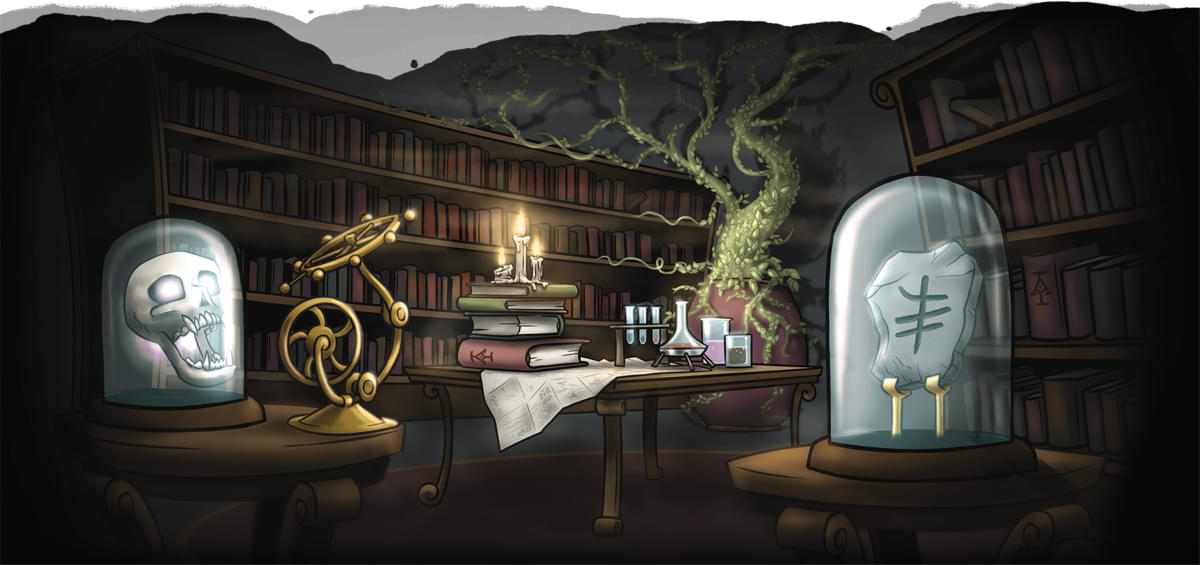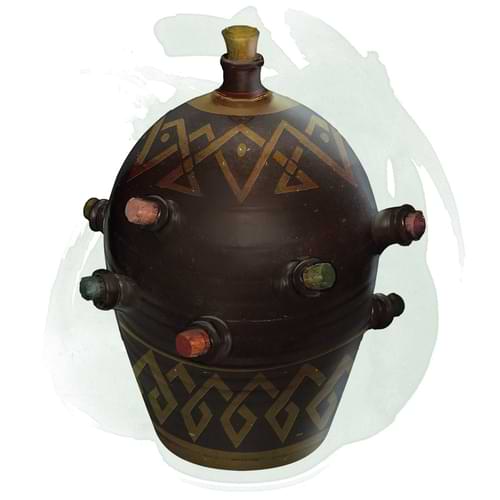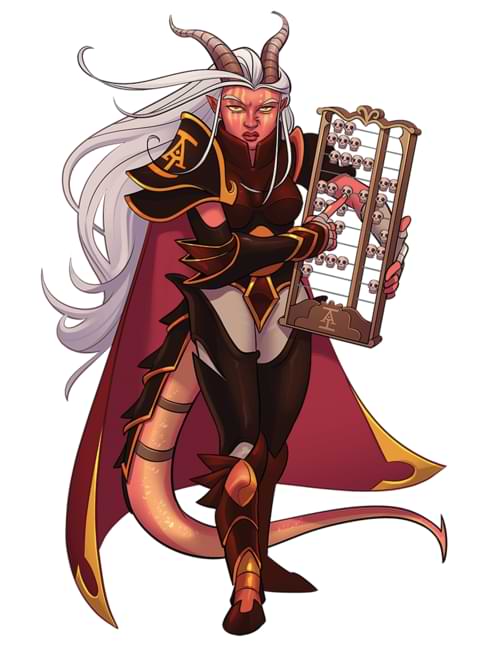A cap of water breathing, a ring of mind shielding, a driftglobe. Plenty of magic items found in Dungeons & Dragons books are only situationally useful, and rightfully so. But gold-strapped players might overlook such items during the perennial shopping session, opting for magic items their characters are sure to use in the adventures ahead.
If you want to encourage your players to explore new kinds of magic items or even drop hints of challenges to come, you can offer magic item rentals. Here's how.
What if my campaign is in a low-magic setting?
If you don't permit magic items in your campaign or the adventure takes place in a low-magic setting, magic item rentals can feel out of place or go against the mythos you've established. In these cases, consider renting out unique equipment or even vehicles. Characters embarking on a cross-country adventure could be thrilled to learn that they can rent out a lavish carriage outfitted with a workspace and plush bedding. You could also offer clothing rentals that help the characters better express themselves or influence certain non-player characters (NPCs), such as at a local lord's event.
How to implement magic item rentals
Allowing the characters to rent out magic items takes some upfront work on your part as the Dungeon Master. Follow these steps to get started.
1. Decide who is offering the service

As you construct your magic item rental system, consider any previous shopkeeps, organizations, or powerful NPCs the party has had a positive experience with that could benefit from renting out magic items. Perhaps a shop owner has begun renting out his less-popular merchandise or a retired adventurer rents out his old gear to fund their lavish lifestyle. The characters are powerful adventurers whose fame will only grow over time, so anyone seeking to establish themselves in the magic item business would do well to work out a deal with the party.
However, you might not need to look any further than the characters' own employer. In a previous adventure I ran, the characters were part of the Realm Guard, a homebrew faction. They were responsible for investigating mysterious portals to the Shadowfell that were appearing along the Sword Coast. The characters were sent on all manner of quests in different locations. They spent whole sessions in Baldur's Gate and ventured into the Forest of Wyrms, for example. Although the faction supported the party, it did not have the funds to simply gift magic items to the characters. Instead, it allowed them to rent out magic items from a small collection. This allowed the Realm Guard to raise funds for their operations.
2. Determine which magic items can be rented
 The Realm Guard's rental system was simple. At its base in Baldur's Gate, the characters could peruse a curated selection of around a dozen magic items. After each quest, the list of magic items would update, reflecting the fact that other faction members were renting out and returning magic items. I specifically chose magic items that I hadn't seen my players' characters use in previous campaigns, that encouraged roleplay, or that I just wanted to see in action. In one case, I included a saddle of the cavalier, a wink to the fact that the characters would soon obtain mounts.
The Realm Guard's rental system was simple. At its base in Baldur's Gate, the characters could peruse a curated selection of around a dozen magic items. After each quest, the list of magic items would update, reflecting the fact that other faction members were renting out and returning magic items. I specifically chose magic items that I hadn't seen my players' characters use in previous campaigns, that encouraged roleplay, or that I just wanted to see in action. In one case, I included a saddle of the cavalier, a wink to the fact that the characters would soon obtain mounts.
I only included magic items that wouldn't make my life harder as the DM. (Sorry, helm of teleportation.) That means I only included common and uncommon magic items. Because I'm already generous with loot, I abstained from popular options as well, like cloaks of protection and winged boots. I offer such magic items during major story beats and challenging combat encounters. For high-level parties, however, you might include some rare magic items.
To help you brainstorm magic items to rent out, here's a list of the rentals I offered my group of low-level adventurers:
Offering a rent-to-own program
If your players' characters are hoping to one day own a staff of fire or similarly expensive magic item, you could implement a rent-to-own program. With this type of program, the characters' rental payments are counted toward the magic item's purchase price. So, if that dragon scale mail costs a whopping 10,000 gold, a character could take it on their adventures and eventually come to own it. This allows the players to enjoy rarer and more powerful magic items long before their characters could normally afford them. Just make sure that permitting the characters to acquire such magic items doesn't make balancing encounters impossible for you.
3. Set the cost for the magic items
 The Dungeon Master's Guide assigns general gold values for magic items based on their rarity. To make your job of determining rental prices easy, you could make the rental cost of a magic item equal to 10% of its average value. For example, a rare magic item is typically valued at 501 to 5,000 gold, so it would cost about 275 gold per rental period. You could then adjust this amount according to the following factors:
The Dungeon Master's Guide assigns general gold values for magic items based on their rarity. To make your job of determining rental prices easy, you could make the rental cost of a magic item equal to 10% of its average value. For example, a rare magic item is typically valued at 501 to 5,000 gold, so it would cost about 275 gold per rental period. You could then adjust this amount according to the following factors:
- How long the character will have the magic item
- How powerful you perceive the magic item to be
- The demand for such a magic item
Because my party didn't have a lot of gold and I stuck to common and uncommon magic items that were only situationally powerful, I charged the characters 5 to 25 gold per rental. Keep in mind that I'm generous with magic items and the characters only had the magic items for about three sessions at a time. You might have to toy with pricing and the selection of magic items before you hit that sweet spot — where the characters are willing to spend their hard-earned gold to rent magic items but planning encounters isn't any more difficult for you than usual.
If you're concerned about the party stocking up on tons of magic items at once, set a hard limit on how many magic items they can rent. A vendor might be excited to see that their stock of magic items has driven a lot of interest but still refuse to rent out more than one magic item per character in order to limit their risk. Adventurers do have a nasty habit of dying, after all.
4. Establish how and when magic items should be returned
In my adventure, the characters quested in and around Baldur's Gate. They had free lodging at the Realm Guard's base, so it was fitting that they were asked to return any rented magic items after each debriefing. However, you might need to get clever if your adventurers will be traveling far on their quests or be gone for long periods of time.
Consider these ways that a rented magic item could be returned:
- A courier service employs quicklings and specializes in the delivery of magic items. The delivery fee is included in the rental price.
- The magic item is teleported back to its owner on the seventh dawn after it was rented.
- The magic item can be returned at any number of (well-guarded) dropoff locations.
- The character is provided a magical chest that can be used to return the magic item.
5. Include penalties for late returns and thievery
 To ensure the characters promptly return magic items, establish a penalty for late returns. For each day a rental is late, the character is charged a fee equal to 1% of the magic item's rental cost, for example. You could also stipulate that a rented magic item is considered stolen 14 days after its due date. This would ensure the characters make it a priority to return their magic items, or at least lead to a hilarious roleplay moment where they suddenly find themselves getting arrested for thievery.
To ensure the characters promptly return magic items, establish a penalty for late returns. For each day a rental is late, the character is charged a fee equal to 1% of the magic item's rental cost, for example. You could also stipulate that a rented magic item is considered stolen 14 days after its due date. This would ensure the characters make it a priority to return their magic items, or at least lead to a hilarious roleplay moment where they suddenly find themselves getting arrested for thievery.
If the characters do have sticky fingers, have a failsafe so that they don't run off with hundreds or thousands of gold worth of magic items. For example, if a magic item is not returned on time, it could lose its magic until returned or impart a curse on whoever has it. If you wish to prevent the characters from selling stolen goods, each magic item could bear a script that designates it as a rental.
Play with new magic items
A magic item rental system is a low-risk way for you and the party to experience a wide variety of magic items. If you rent out a magic item but find that it creates an imbalance, you can rest assured that the character will only have the magic item for a short while. On the flip side, you might find that your players enjoy testing out magic items that they'd otherwise look over. One of my players rented a ring of jumping on a whim and had so much fun that he asked to purchase it from the faction. I was ecstatic to hear him say that he'd been sleeping on the magic item.
I think that's the real strength of this type of system: it encourages the players to experiment and it won't empty their characters' pockets. I hope you try it out and love it!
Michael Galvis (@michaelgalvis) is a tabletop content producer for D&D Beyond. He is a longtime Dungeon Master who enjoys horror films and all things fantasy and sci-fi. When he isn’t in the DM’s seat or rolling dice as his anxious halfling sorcerer, he’s playing League of Legends and Magic: The Gathering with his husband. They live together in Los Angeles with their adorable dog, Quentin.








-
View User Profile
-
Send Message
Posted Nov 17, 2021This is the first article in a long time that I actually found useful and within the proper spirit of dnd! Well done!
-
View User Profile
-
Send Message
Posted Nov 17, 2021@Michael Galvis does this mean you are advocating a move away from the official stance that magic items are super rare and there are no magic shops in DnD 5th? Because it sure seems like it.
-
View User Profile
-
Send Message
Posted Nov 17, 2021Very nice article. Will sure to be using this idea in my future campaigns!
-
View User Profile
-
Send Message
Posted Nov 17, 2021Clever! I'm totally using this idea :)
-
View User Profile
-
Send Message
Posted Nov 18, 2021If I ever DM, I am absolutely going to use this idea, AND make a blatant knockoff of Stan from the Monkey Island games to serve as the proprietor.
-
View User Profile
-
Send Message
Posted Nov 18, 2021Very clever idea for a rental system for magic items! I’ll definitely be making use of this idea in future campaigns now that I know how to properly use the concept. I’m glad I stumbled upon this!
-
View User Profile
-
Send Message
Posted Nov 19, 2021Infusion service prices:
the base table I use for pricing is the Magic item base prices *halved like consumables list "Downtime activity: Selling a magic prices" (XGE p.133) combined with the replicate magic item list.
- 50gp: base infusion options, replicate common-items, and replicate items (2nd-level-artificer) table.
- 200gp: prereq:6th level infusions, and replicate items (6th-level-artificer) table.
-2.000gp: Helm of Awareness, and replicate items (10th-level-artificer) table.
-20.000gp: Arcane propultion armor, and replicate items (14th-level-artificer) table.
NOTE: Remember that an Infusion store npc doesn't have access to extra infusion options, nor can infuse more items than a normal Artificer of the same level. Instead they partner up when opening store providing a larger stock and variety. 2 day infusions:
Infusion shops always offers their highest level infusions
cost for multiple days:
- small infuser shops takes 50gp pr. day infused, which is payed first, then the item is infused.
- medium shops with a 6th level artificer also offers the 50gp type but will try and avoid infusing them multiple days (lost income, but a good persuasion check might convince them?)
- large shops same as medium, but doesn't offer 50gp infusions, and direct them to a small infusion shop, unless the shop apprentice hasn't infused that day.
- Huge infuser shop can offer you any infusion of choice, they will however take 100gp for lowest infusion and 400 for the the 6th level options
-
View User Profile
-
Send Message
Posted Nov 19, 2021This shouldn't be here, but well.
Just click the number with the plus in front of the name of the attack/spell in the actions tab. It will then roll and add the modifier. To roll damage, do the same but with the damage column.
Hope it helps
-
View User Profile
-
Send Message
Posted Nov 20, 2021What a good idea.
-
View User Profile
-
Send Message
Posted Nov 21, 2021Another idea: have magic items that are created via Artificer infusion. If not returned by the deadline, the Artificer in question will simply apply the infusion to a different item, disabling the previous infusion.
-
View User Profile
-
Send Message
Posted Nov 24, 2021This sounds awesome! I will be implementing this into my games :)
-
View User Profile
-
Send Message
Posted Nov 25, 2021For extremely high-level characters(15-20) and Very Rare+ Items, consider placing the shop in Sigil or another place of abundant magic. Have a Marut witness the contract and employ it to recover the magic item or punish those who try stealing.
"..engrave a contract onto a sheet of gold that was installed on a marut's chest. The marut then became bound to ensure that the contract was fulfilled to the letter"
A marut commanded an array of magic, replicating the spells
air walk,dimension door, fear,greatercommand,greaterdispel magic,mass inflict light wounds, locate creature, and true seeing as often as it willed; chain lightning, circle of death,mark of justice, wall of force each once a day; and earthquake, geas/quest, and plane shift each once a week."I would also probably give the Marut Feeblemind and Bestow Curse(9th level) to give it more options for punishment. Either that or just teleport them into custody with its Plane Shift.
-
View User Profile
-
Send Message
Posted Nov 27, 2021I like the idea of a quickling courier service! I might implement that into my game, with or without the magic item rental idea.
-
View User Profile
-
Send Message
Posted Nov 27, 2021"Clients MUST return rental items with no less than 1 charge remaining or a 150% restocking fee will be applied."
-
View User Profile
-
Send Message
Posted Apr 2, 2022I do this in my homebrew campaign with artificer's guilds using infusions; you essentially rent an artificer's infusion slot for x number of days.
-
View User Profile
-
Send Message
Posted Apr 4, 2022make it up
-
View User Profile
-
Send Message
Posted May 25, 2022I think that a good way to do it with the artificers would be to have them research a new infusion. This infusion would create a little mouth thingy that you would put the required amount of gold pieces in daily and the gold would go to the artificers and if you didn't pay then the item would teleport back to the artificers. You could also do a rent to own thing where once 150% of purchase price has been paid it is bought the mouth disappears and then a receipt comes out saying it is now owned.
-
View User Profile
-
Send Message
Posted Feb 20, 2023Being the dm, this poses some really funny repo concepts.